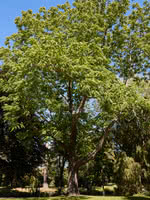Mon-Fri 9am - 5pm Mountain time
Black Walnut vs Water Birch (Red Birch)
Juglans nigra
Betula occidentalis
NOT AVAILABLE THIS SEASON - MIGHT RETURN
CUSTOM GROW
The Black Walnut is a slow growing, large, straight-stemmed tree with an open crown. It produces dense, very hard, edible nuts.
Black Walnut has a deeply-furrowed, black bark. Its leaves are about 1 foot long, composed of 15 - 23 slightly stalked leaflets on a moderately stout stock which provide good dappled shade.
Despite being highly valued for its edible nuts and its shade tree aesthetics, it is rare to see this tree on the prairies.
Note: Black Walnut's roots produce a substance named juglone that is toxic to some other plants. Consider this when choosing where you plant a black walnut, as you will not be able to grow tomato, potato, cabbage, eggplant, blueberry, azalea, rhododendron, lilac, red pine and apple in the surrounding area.
Note: Plant this tree once. It will not respond well to transplanting.
Note: Although self-pollinating, planting two trees significantly improves nut production.
A top CO2 absorbing species. Experts think this tree may help climate change more than others.
Water Birch, also known as Red Birch, is a waterside plant native to western North America. This multi-stemmed species is ideal for wetlands. It tolerates being planted in heavy clay and wet soil conditions.
This tree grows small enough for yards with limited space.
It is an attractive ornamental with reddish non-peeling bark.
Note: Unfortunately this difficult to grow species is not currently scheduled to grow at TreeTime.ca. Perhaps try purchasing seed from SeedTime.ca and growing your own? Or sign up for a restock notification above.

